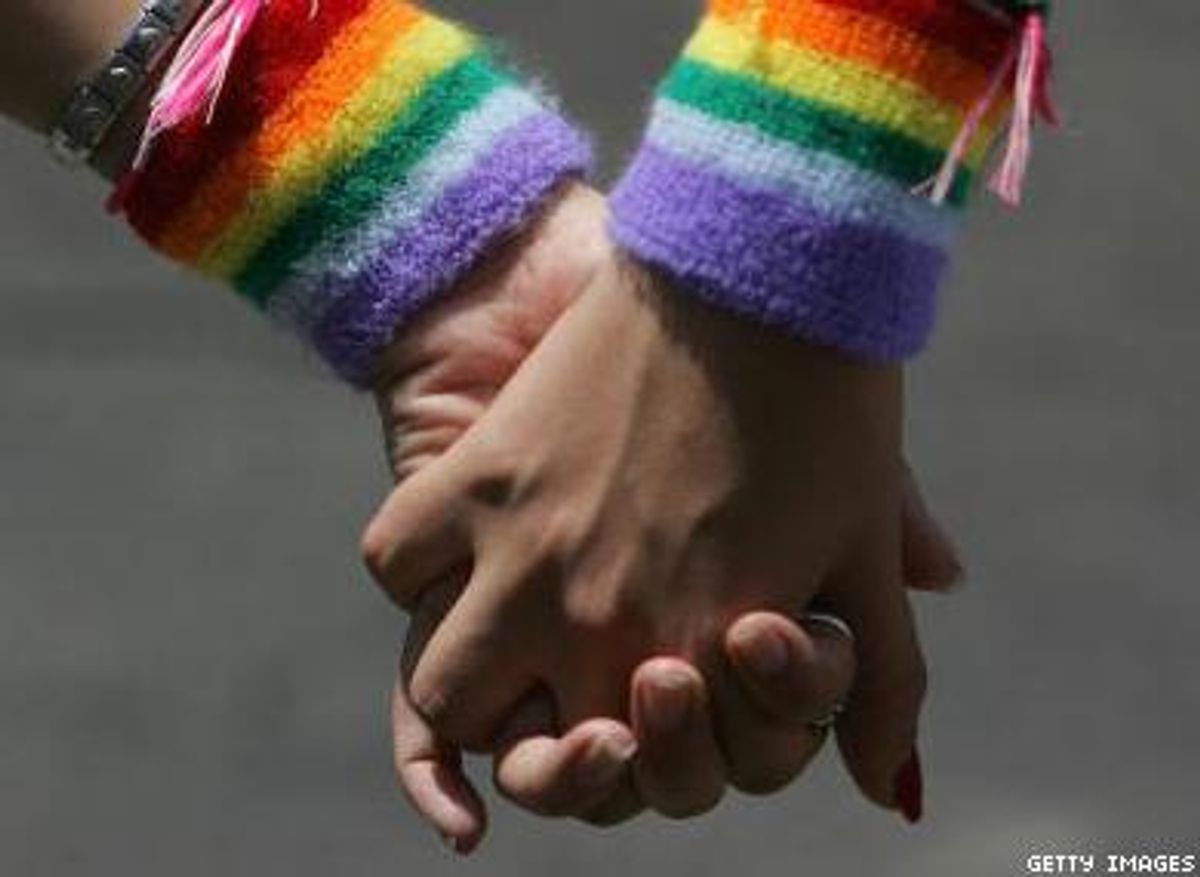By the tenor and content of many gay media reports today, it appears as if the conversation in the queer community about sex is only by and about gay men like Dan Savage, and (somehow) by extension, how perhaps straight couples are learning new models of partnership from gay men's relationships.
In reality, queer women are indeed talking about the same things gay men are talking about vis-a-vis sex and relationships. And it's more likely that lesbian-feminist thought and action is as much as (or more of) a template for "alternative" sexual habits among heterosexuals as gay male sex/relationship rituals ever were.
The important point here is that queer sisters and I are part of the conversation too, and we are tired of not being heard. The reason for the scarcity of lesbian voices is that we generally are not published (nor quoted), or paid (well) to think and philosophize about sexuality, or even listened to about what goes on in lesbian relationships when we do want to speak.
How can lesbians know anything about sex, the collective and conventional thinking goes. We have been tarred and feathered with mythology about U-Hauls and lesbian bed death, as if these are the only two options available to us as sexual and social creatures.
What and how queer women think and feel about relationships (how we form them, maintain them, what we think about monogamy, nonmonogamy, polyamory, and all those other pesky sex questions -- or even thoughts and feelings about levels of commitment and fulfillment) is often dominated in the press and in the community by men.
When sapphic-leaning sisters are sitting around talking, rest assured we are often discussing sex and relationships, and likely even lusting after the gal sitting next to us. Lesbians and bisexual women at, for example, the annual Scholar and Feminist Conference at the Barnard Center for Research on Women, or even the annual Michigan Womyn's Music Festival, are continually thinking about, theorizing, and telling the truth about queer female relationships, both in the home and between the sheets. And we are pursuing those relationships -- whether casual, committed, or anywhere in between.
Our relationships are often messy and indefinable and maybe not so elegantly categorized or categorically compartmentalized as Savage would have it for gay men. But Savage has a pulpit in his large (and largely straight) audience, so people listen. Perhaps that's the key to gaining awareness and visibility for lesbian and bisexual women. You might ask, Well, why isn't there a nationally syndicated columnist who speaks for lesbians the way Savage does for men?
There are, in fact, women who write about sex and relationships, about women's sexual fluidity, about the way we have impacted straight women's concepts of sex, marriage, and love. But unfortunately, they don't have national syndication deals. Susie Bright a pioneering sexpert in the queer women's community, is still writing about sex and monogamy and the falsehoods of relationships for The Huffington Post--and she does so by including sexuality issues relevant to lesbian, bisexual, and transgender individuals, something gay columnists like Savage rarely do.
There's also lesbian Felice Newman and queer sexpert Tristan Taormino (whose Village Voice column ran for a decade), and bisexual Betty Dodson (who has been peddling her feminist sex education for women for six decades). There are dozens of books published between these three women alone.
And, after "having sex with 3,452 men, 371 women, and 83 1/2 trans people," Annie Sprinkle came out as eco-sexual, a bent that's interesting to say the least. Her eco-sexual wedding to another woman, Elizabeth Stephens, and their post-queer "sexecology" philosophy (exploring the places where sexology and ecology overlap) is ripe for broader cultural interpolation and interpretation about women and sexuality.
But, on further reflection, why do we need a leader, a national voice to "represent" queer women in the ongoing conversation about sex, love, relationships, marriage, and baby carriages when we all have very different thoughts, feelings, and arrangements? No one person can -- or should -- speak for all of us, but it'd be great if the media and the broader LGBT community listened to those who did instead of marginalizing women in this conversation.
The manner in which Dan Savage extols the virtues of coupledom and family above all else with his "monogamish" solution to the supposed boredom, despair, or lack of a partner willing to be "GGG" (good, giving, and game) in a monogamous relationship is not even a way lesbians necessarily think. Some of us may, others may not. (And many women find the admonition to be game for anything at any time to be a terribly sexist throwback to the 1950s.)
Queer women experience the weird, dishonest, and illicit as well as the so-called normal, familiar, and predictable in myriad ways through a prism of lesbianism that encompasses gender, race, ethnicity, size, age, class, and oh, so much more.
Lesbians and bisexual women have a different and complicated relationship to sex and relationships. It's our socialization as females, sure, but we are much more than our social indoctrination. I cannot cite any studies about lesbian sexuality that are not over two decades old, but I do know that public and private perceptions of lesbians as extremely boring, putridly practical women in sensible shoes is a wrong one.
We hook up, we fetishize, we fuck, we marry, we practice BDSM, we make love, we live together, we hook up, we are monogamous, we are nonmonogamous, we are polyamorous, we manipulate, we cheat, we abuse, we are lesbian, we are bisexual, we are asexual, and all of these options and more are prevalent in the queer female community.
Lesbians are not a monolith. There is no one woman who can speak for all of us. Every single lesbian has her own way of carrying on her affairs, and our stories do need to be told -- and heard. When will gay men shut up and just listen?


















































































